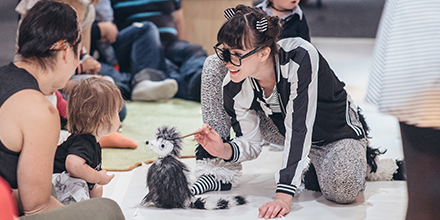This guide will talk you through making work accessible for Deaf and hard of hearing people, autistic people, and visually impaired people. To start, we have some general information and tips.
Please note: this guide refers to D/deaf people. People who identify as Deaf are usually profoundly Deaf and identify as culturally Deaf. They often use BSL as their first language and are part of the Deaf community. People with some hearing loss may identify as deaf. English is usually their first language, and while they may have some knowledge of BSL they will tend to use spoken English.
- Be clear and descriptive in the ways you are seeking to remove barriers for the audience. If you are trying something new, explain why you have made that choice and how it is going to benefit the audience.
- Consider the accessibility of the venue – does it have level access? Does it have an accessible toilet? The accessibility of your venue will impact the audience you want to reach – for example, a show with added Audio Description, in a venue that doesn’t have level access, is unlikley to get any blind audiences
- Ask the venue if their staff have completed, or will undergo, accessibility training. The Fringe Society provides free online disabled equalities training and runs training sessions for venue staff in Edinburgh just before the festival begins.
- Think about how you can help make the space more accessible; about how can you create a welcoming and safe environment within the constraints of the festival. Possible ideas include: clear signage informing Deaf audiences where to sit to get the best view of an interpreter; clear signage to accessible toilets.
- Check with your venue that personal assistant tickets (PA) are available for your show. These tickets are available, free of charge, to enable D/deaf or disabled people to attend performances that they would not be able to without the assistance of another person.
- Include targeted audience members in the development process. For example, if the show will include BSL interpretation, seek the advice of a Deaf person or invite them to rehearsals for feedback.
- Not all shows are suitable for all accessible features, for example a visual performance will probably not require BSL interpretation, however it may benefit from audio description.
- If a show is largely visual but has a small amount of dialogue or audio content, though not enough to justify the use of a captioner or interpreter, consider if the performance will be understandable to audiences who are not able to access the aural elements. If you believe it is accessible (have you consulted a disabled person?), be clear in your promotion of the show how it is accessible. Consider also if you are able to make a transcript of the dialogue available for the audience – this will not only benefit D/deaf or hard-of-hearing people but would also prove useful to those for whom English is not their first language. A variety of transcript resoures and providers are available online, for free and charged.
- Often accessible performances are scheduled at times when the audience may not be able to attend, with many at the Fringe programmed for weekdays. D/deaf and disabled people, and their friends and families have jobs too! You are far more likely to reach your target audience if you schedule your accessible performance when most people will be free, so think evenings and weekends (and more than one slot!).
Online resources
Below are some organisations who provide resources and/or guidance on the development of accessible performances:
- Solar Bear – Since 2002, this Scottish theatre company has produced work with D/deaf performers and theatre makers, and young D/deaf people.
- Birds of Paradise – With over 25 years’ experience, they are Scotland’s first disability-led theatre company.
- Unlimited – Unlimited is an arts commissioning programme that enables new work by disabled artists to reach UK and international audiences.
We're here to help! Contact the Fringe Society for more information on [email protected].
Case Study: Amplified Theatre
Stephen Lloyd of Amplified Theatre shares his experience making work inclusive and accessible but with limited budget. Find out about the creative solutions they have used which prove that putting on an accessible performance doesn't need to cost the world.
